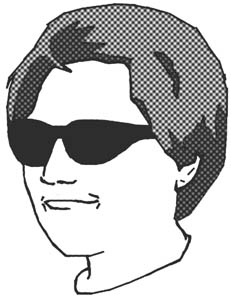![[Metroactive Features]](/features/gifs/feat468.gif)
[ Features Index | Silicon Valley | Metroactive Home | Archives ]

Techsploits Finding Arisia By Annalee Newitz I'VE READ a zillion stories about queer people coming to San Francisco or New York City or Toronto or wherever and finding their true community. The tale always goes like this: The person in question was born in a place where there were no other queers. The person's post-puberty years were a torment of buried desires and violence. And then (insert boppy music here) when our hero arrives in a place with a thriving queer community, suddenly there is safety and love and caring kinship networks. OK, so I'm exaggerating a little bit. But most people recognize the basic narrative trajectory I'm describing: endangered sexual minority flees intolerance to find happy urban home among others of her or his kind. But where are these narratives for the rest of us? I'm glad I have my nice queer community where people tolerate my love for trannies and girl jocks. But it never inspired that "coming home" feeling for me. That's because my people are scattered all across the country and the world, united not by a sexual orientation or gender-based experience but instead by a taste for the technical and scientific. And--most importantly--they thirst for alternative worlds. Once in a while, my people and I gather together in hotels for weekend celebrations that involve group discussions of science fiction, debates about the ethics of hacking and long dinners that occasionally end with intoxication, orgies and passionate debates about whether Creative Commons licensing is a good idea. Two weekends ago, I shipped myself all the way to Boston to participate in one of the country's best examples of this kind of celebration: it's called Arisia, and it's sort of a cross between a science fiction convention and a kinky nerd freak-out. Wandering the halls of Boston's Park Plaza hotel at midnight on Friday night, I knew I was home. In the ballroom, a goth band called the Dresden Dolls was squealing out a song about playing with coin-operated boys. In other spots, intense people wearing T-shirts with algorithms on them were debating PGP vs. GPG. People dressed like fairies were making out with people dressed like 19th-century gentry. Eric Raymond was flirting in the convention suite, and Cecelia Tan was holding court at the Circlet party. "I don't understand geek mating rituals," a cute writer said to me. I don't seem to have that problem. Nor, it seemed, did she; later that night, I watched her convince a hot boy to take his clothes off in a game of strip-Doctor Who trivia. Frankly, I don't think her victim was trying very hard. Doesn't everybody know the name of the Daleks' home planet? I mean, duh. Saturday night, after a day of attending panels devoted to everything from Godzilla to freedom of information in the computer age, I found the ultimate geek slut at one of the dozens of parties on the seventh floor. He was dressed as Wedge, a minor character from Star Wars; not only had he read books by Vernor Vinge and Iain Banks, but he had also liked the movie version of Dune and could sing one of the theme songs from The Krofft Super Show. He told me that he'd been coming to Arisia every year since he was 16. The first time he attended, he walked in the hotel doors and saw three guys hauling a spaceship up some stairs. He knew instantly that he wanted to be hanging out with them. When Wedge showed me his blaster, I knew where I would be at 3am. Why isn't my tale of passions sated and community found as compelling as The L Word or Queer as Folk? Why isn't there a neighborhood in San Francisco where all the nerds live, full of special WiFi-enabled geek cafes, science fiction bookstores and really great computer shops stocked with obscure antenna parts and ASUS motherboards? Is it possible that our culture is more tolerant of queers than it is of flagrant dorkhood? Perhaps the problem lies with the geek social agenda. After all, we aren't just trying to make the world safe for sodomy and gay marriage, although certainly we think these are excellent ideas. We also want to engage in social-engineering projects to make the planet greener, to promote space exploration and the redistribution of technological resources and to create the kinds of alternative families we read about in books by Ursula LeGuin and Robert Heinlein. Perhaps the world isn't ready for a geek revolution. But we still have our cons. We'll just keep making our plans for world domination until everybody else catches up to us.
Annalee Newitz (geekpervert@techsploitation.com) is a surly media nerd who now understands what the rebellion is really made of.
Send a letter to the editor about this story to letters@metronews.com. [ Silicon Valley | Metroactive Home | Archives ]
|
From the January 29-February 4, 2004 issue of Metro, Silicon Valley's Weekly Newspaper.
Copyright © Metro Publishing Inc. Metroactive is affiliated with the Boulevards Network.
For more information about the San Jose/Silicon Valley area, visit sanjose.com.